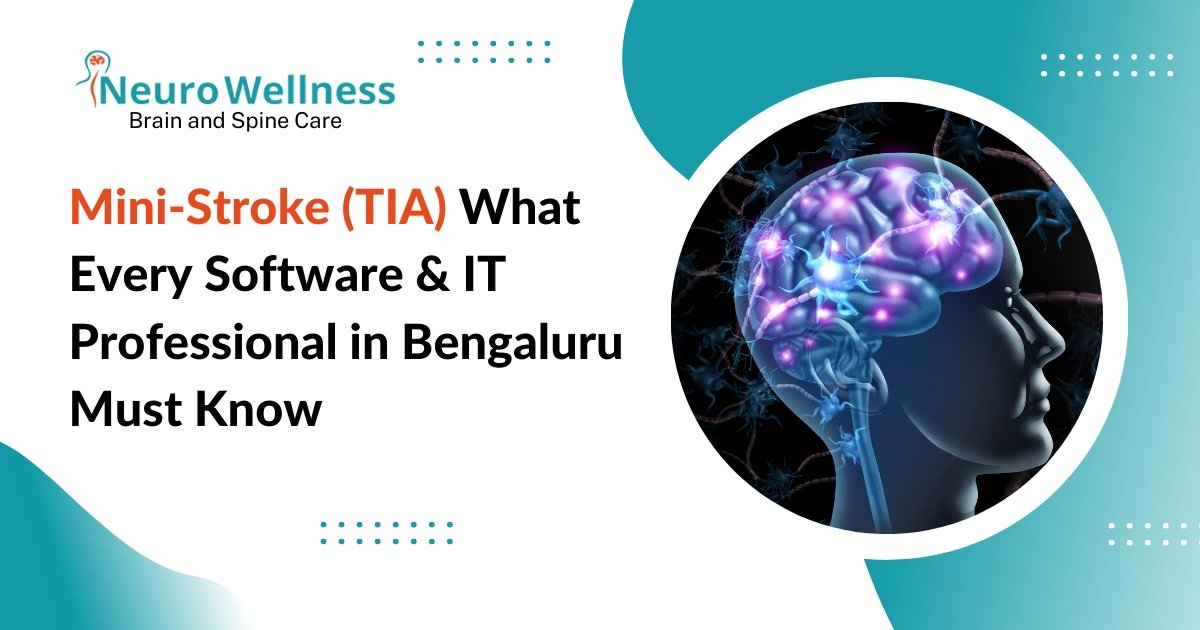Bengaluru is the heart of India’s IT industry. From Electronic City to Whitefield, Outer Ring Road to Manyata Tech Park, lakhs of professionals spend their days coding, debugging, and meeting deadlines. But while we focus on building apps and solving business problems, there’s one bug many ignore—health risks that silently damage the brain.
One of the most important but lesser-known risks is the mini-stroke, medically called a Transient Ischemic Attack (TIA). It comes quietly, disappears quickly, but carries a powerful message: “Take care of your brain before it’s too late.”
What Exactly Is a Mini-Stroke?
A mini-stroke happens when blood flow to the brain is blocked for a short time. Symptoms come suddenly—weakness, slurred speech, blurred vision, dizziness—but vanish within minutes or hours.
That’s why many IT professionals brush it off as “stress” or “just tiredness from screen time.” But in reality, a TIA is a warning signal. Nearly 1 in 3 people who suffer a TIA may go on to have a major stroke later, often within days.
Why IT Professionals in Bengaluru Are at Higher Risk
Read more : Should You Sleep on the Floor or Bed for Spine Health?
Expert Guidance from Dr. Ganesh Veerabhadraiah
If you or your loved ones experience symptoms of a mini-stroke, don’t ignore them. Dr. Ganesh Veerabhadraiah is a highly experienced neurosurgeon in Bangalore with over 20 years of expertise in treating complex brain and spine conditions, including stroke management, cerebral aneurysms, and neurovascular surgeries.
Dr. Ganesh has trained in advanced neurosurgical techniques both in India and abroad and has successfully treated thousands of patients suffering from brain and spine disorders. His deep expertise in stroke prevention and early intervention makes him one of the most trusted specialists for IT professionals in Bengaluru who face lifestyle-related neurological risks.
Why Ignoring a Mini-Stroke Can Be Dangerous
The tricky part is that symptoms disappear fast, making people believe it was nothing serious. But here’s the truth:
What Should You Do If You Suspect a Mini-Stroke?
Practical Tips for Bengaluru’s Tech Crowd
• Say no to smoking & limit alcohol: These directly double your stroke risk.
Read more: 7 Brain Foods to Keep You Fit
Why Bengaluru Needs to Pay Attention
Our city is full of young, ambitious professionals. Yet hospitals are now seeing strokes in patients in their late 20s and early 30s many from the IT sector.
Think about it: a 29-year-old coder in Whitefield collapses at his desk. Colleagues think it’s exhaustion, but it’s a mini-stroke. He recovers in minutes, but that was his warning shot. Two weeks later, he suffers a full stroke that changes his life.
This isn’t a scare story it’s reality. TIAs are happening around us, and we must treat them with urgency.
Read more : Difference Between Neurologist and Neurosurgeon
Final Thoughts
For Bengaluru’s software and IT professionals, the mind is the engine that powers your career. But that same mind is at risk if you ignore the warning signs of a mini-stroke.
A TIA is not the end—it’s a second chance. By acting fast and making small lifestyle changes, you can protect your brain, your health, and your future.
Kauvery Hospital, Electronic City, Bengaluru
📞 7259669911 | 74115 71002

